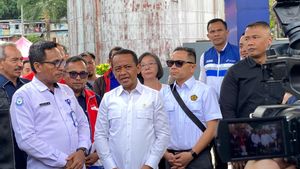JAKARTA - More than 1,000 people are hospitalized in Sistan-Baluchestan Province, southeastern Iran, due to intense sand and dust storms.
Majid Mohebi, director-general of the provincial crisis management department, said a total of 1.047 people had been hospitalized in the last few days in the Sistan region.
The large number of inpatients follows a new wave of sand and dust storms in the province, especially in the cities of Zabul, Hamoun, Hirmand, and Nimroz in the Sistan region.
"Most of the people affected complained of difficulty breathing and heart and vision problems," said Mohebi as reported by ANTARA from Anadolu, Monday, July 17.
The province of Sistan-Baluchestan, which borders Pakistan, is known for its very hot and dry climate that turned the province into a basin of dust and sand.
The rising temperature this year and a prolonged period of drought have led to surface water evaporation, even destroying the well-known Hamoun wetland in the province, according to experts.
Last summer, heavy sand and dust storms and higher levels of air pollution forced the closure of educational institutions and government offices in several Iranian cities, including the capital Tehran.
Director General of the Center of Environment at Iran's Ministry of Health, Jafar Jandaqi, said that exposure to sandstorms and dust endangered the lives of more than 38 million people in Iran.
"The increase in the number of particles in the air increases the possibility of heart disease and disrupts social activities and the public transportation system," he said, as quoted by the IRNA news agency on Saturday (15/7).
Marking International Day Fighting Sand Storm and Dust which is celebrated every July 12, the United Nations (UN) states that sandstorms and dust present major and widespread challenges to achieving sustainable development in economic, social and environmental dimensions.
The United Nations also said at least 25 percent of global dust emissions came from human activity.
The English, Chinese, Japanese, Arabic, and French versions are automatically generated by the AI. So there may still be inaccuracies in translating, please always see Indonesian as our main language. (system supported by DigitalSiber.id)













